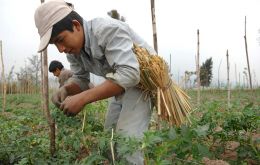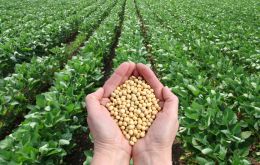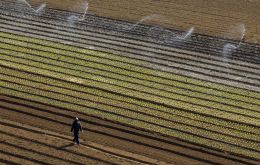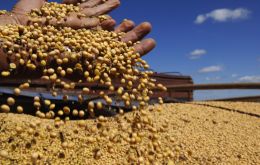MercoPress. South Atlantic News Agency
Agriculture
-
Friday, February 23rd 2018 - 09:21 UTC
Mexico buying more Brazilian corn over concern with NAFTA negotiations

Mexican buyers imported ten times more corn from Brazil last year amid concern that NAFTA renegotiations could disrupt their U.S. supplies, according to government data and top grains merchants. Mexico is on track to buy more Brazilian corn in 2018, which would hurt a U.S. agricultural sector already struggling with low grains prices and the rising competitive threat from South America.
-
Friday, February 23rd 2018 - 09:13 UTC
Argentine farmers agree to pay royalties to seed companies like Monsanto

Argentine farmers have agreed to pay perpetual royalties when they replant genetically modified seeds made by companies like Monsanto Co, a deal that could allow farmers access to the newest biotechnology.
-
Thursday, February 22nd 2018 - 09:20 UTC
US share of global sales of soybean and grains to shrink as South American competition grows

The U.S. Department of Agriculture sees U.S. corn and soybean exports generally increasing over the coming decade but the U.S. share of global sales will shrink as competition from South American producers heats up, the government said in its annual report.
-
Wednesday, February 21st 2018 - 09:02 UTC
Second corn-based ethanol plant in Matto Grosso: 680m liters per year

FS Bioenergia, a joint venture between Brazilian and U.S.-based investors, said on Tuesday it will build its second corn-based ethanol plant in Brazil’s top grains-producing state of Mato Grosso. FS Bioenergia, the first venture to build a 100 percent corn-based ethanol plant in Brazil - where basically all ethanol is made from sugar cane - said it will spend 1 billion reais (US$ 308 million) on the project.
-
Wednesday, February 21st 2018 - 08:53 UTC
Illinois farm industry concerned with main competitors Argentina and Brazilian growth

A market study tour in January to Argentina and Brazil by the US state of Illinois Farm Bureau helped farm bureau leaders and Illinois farmers learn more about their chief competitors. Tamara Nelsen, senior director of commodities at the Illinois Farm Bureau, said the original plan to go to Canada and Mexico was scrapped due to anti-trade rhetoric, which led experts to point them to South America.
-
Wednesday, February 21st 2018 - 08:48 UTC
Brazil forecasts record 2027/28 soybean crop of 115.6 million tons

Brazil's 2017/18 soybean crop is expected to reach 115.6 million tons, a record volume, 1.2% above the previous record last year of 114.2 million tons, according to an updated forecast from consultancy Safras & Mercado.
-
Wednesday, February 21st 2018 - 07:19 UTC
Switzerland interested in a trade deal with Mercosur despite its own farmers

Swiss Economic Affairs Minister Johann Schneider-Ammann wants to speed up a free trade agreement between Switzerland and Mercosur, but there is concern in the agricultural sector, according to the country's media.
-
Tuesday, February 20th 2018 - 10:18 UTC
Vazquez in verbal clash with dissident farmers and loses his temper

Uruguayan farmers are angry, and so is president Tabare Vazquez who was involved in a high tone incident, far removed from what is his normal style of an oncologist having to communicate bad news. On Monday afternoon Vazquez unexpectedly attended the first round of talks between disenchanted farmers’ lobbies with government officials to discuss a raft of measures to overcome some of the long standing complaints.
-
Saturday, February 17th 2018 - 09:33 UTC
European farm lobbies want no further agriculture concessions to Mercosur

European farm lobbies Copa and Cogeca sent a letter to EU Commission President Jean-Claude Juncker opposing the EU move to give further concessions on agriculture in return for gains in other economic sectors to Mercosur.
-
Friday, February 9th 2018 - 20:18 UTC
Brazilian current soy crop estimated at 110.4m tons, but 3.2% less than last year

In their latest monthly report, Conab (National Supply Company) increased their estimate of the 2017/18 Brazilian soybean crop by 1.2 million tons and they slightly increased their Brazilian corn estimate. Conab is now estimating the 2017/18 Brazilian soybean crop at 110.4 million tons which is 1.2 million tons more than last month's estimate (109.1 million tons). If realized, the 2017/18 crop would be 3.6 million tons lower than the 114.0 million tons produced last year (-3.2%).